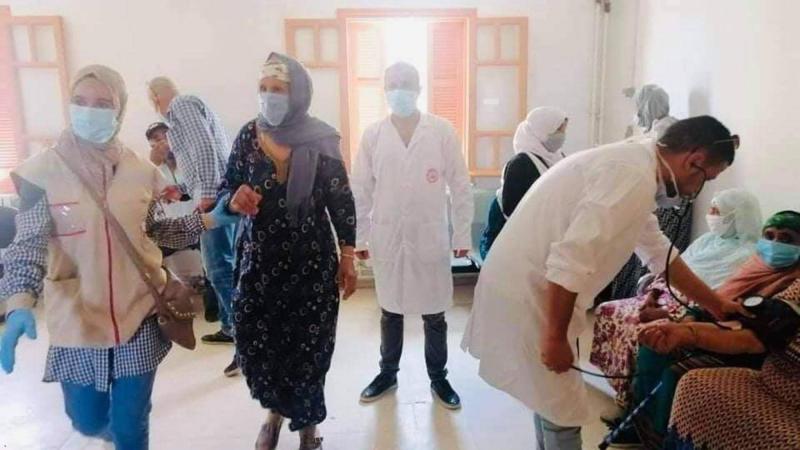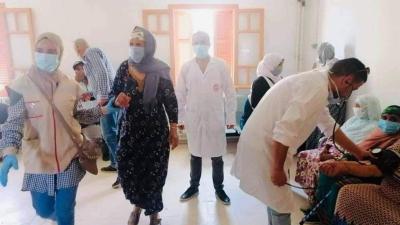Under the title "Catastrophic Situation in Hospitals and Oxygen Shortage: COVID-19 Devastates Tunisia," Sky News reported that as the daily infection rate from the COVID-19 virus in Tunisia approaches 10,000, the Ministry of Health stated on Thursday that the country's healthcare system has "collapsed" following the rapid spread of the pandemic, overflowing intensive care units, and overworked medical staff.
Nisaf Ben Ali, a spokesperson for the Ministry of Health, commented in a media interview that the situation inside hospitals is "catastrophic," and that doctors are experiencing "unprecedented exhaustion," while officials are struggling to provide oxygen for patients. Tunisia has been recording record numbers of deaths and infections over the past week, reaching 134 deaths and 9,823 infections on Wednesday, amid increasing fears that the authorities are unable to control the outbreak, leading to a catastrophic scenario for the health crisis.
Nour El-Samrani, Director-General of Health Structures at the Ministry of Health, stated in a comment to Sky News Arabic that, "The number of patients entering intensive care units has doubled recently, especially with the emergence of the Indian variant (Delta) in the country." He confirmed that "there is significant pressure in various COVID-19 departments and intensive care units, with occupancy rates at 95% in resuscitation beds and 90% in oxygen beds."
El-Samrani added, "We are working to add extra beds in other departments and outpatient clinics daily, and we have suspended all non-urgent surgeries to accommodate COVID-19 patients." He further noted that oxygen consumption in Tunisia has risen from 25,000 liters per day during previous waves of the pandemic to over 125,000 liters per day, necessitating the import of oxygen and accelerating the acquisition of concentration machines for distribution to hospitals.
The official stated that Tunisia's healthcare system "has endured despite the pressure and has resisted the pandemic despite the large number of patients," urging citizens to reduce this pressure by breaking transmission chains and adhering to preventive protocols.
#### Government Measures
Tunisian authorities have imposed a comprehensive lockdown in some cities and regions experiencing widespread virus transmission since last week, while tightening preventive measures in other areas and provinces.
On Thursday, the government decided to prohibit movement between the country's provinces until the end of the month, exempting essential supply activities and transports for students taking exams. Authorities also called for better organization of livestock sale points, prohibiting sales in closed spaces or within urban areas.
The Cabinet discussed on Thursday a health emergency law that enables the government to take exceptional measures to combat the spread of the pandemic, protect public health and safety, and allows for the declaration of partial or complete lockdowns, monitoring the residence of infected or suspected individuals, limiting their movements, including isolation at home, imposing restrictions on the freedom of movement of individuals and vehicles, closing public establishments, and prohibiting gatherings and activities of all kinds.
The law also grants the Prime Minister the authority to establish exceptional economic, financial, or social measures to address the consequences of the exceptional measures taken during the health emergency.
#### Difficult Conditions
Several regions in Tunisia are experiencing extremely difficult conditions. In the testing center located in the Zghwan province in the north of the country, the capacity of the local hospital has exceeded its maximum limits, and oxygen supplies have run out, prompting health authorities to urgently intervene and transfer patients to nearby hospitals.
Seventy-five Tunisian doctors from all specialties issued an urgent appeal to the authorities to implement a comprehensive lockdown for at least six weeks, fully close the borders, and mobilize all public and private human and material resources in the country to combat the pandemic and acquire 14 million vaccine doses.
In the "Call Document," the doctors emphasized that the proposed measures are "the only solution to stop the virus's spread and reduce the number of hospitalized patients, especially in light of the looming threat of the Delta variant."
It is worth noting that Tunisia continues to record high death tolls, exceeding 15,700 deaths since the onset of the pandemic.




